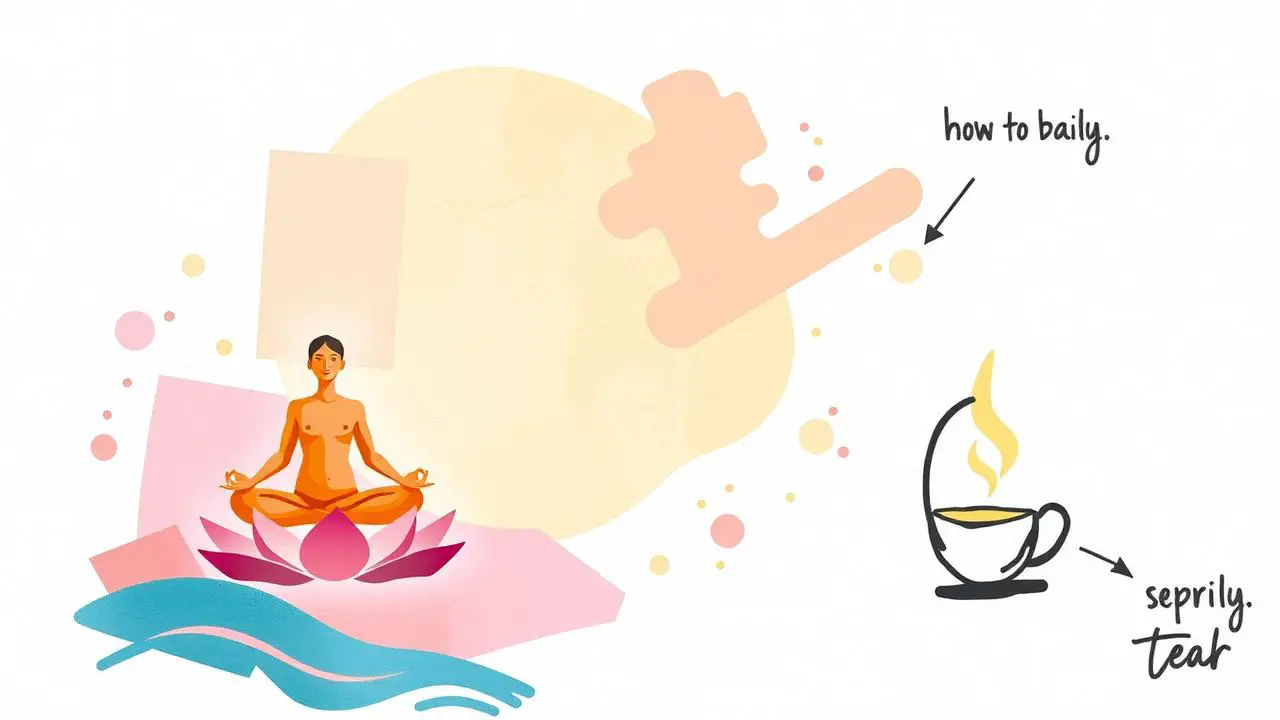Mindfulness, a form of awareness, has eight key principles, referred to as the eight pillars of mindfulness. By incorporating these tenets into your life, you can make mindfulness a regular practice.
There are 8 pillars of mindfulness, which are the basic principles of the practice. They are:
- Awareness
- Acceptance
- Letting go
- Non-judgement
- Patience
- Kindness
- Generosity
- Gratitude
All of these principles are important for developing a mindfulness practice.
When was the last time you did something that you were truly present in? The kind of present where you felt yourself completely in the moment, aware of all the details around you, and grateful for life?
Now, imagine what that would feel like, and why we tend to live life in such a distracted state of mind.
Mindfulness is a set of practices that help us to get back into the present, and to focus on what’s going on right here, right now.
If you’re looking for ways to become more mindful, then you’ve come to the right place. In this article, we’ll share eight pillars of mindfulness that will help you achieve your goals and live a happier life.
1. Awareness
The first pillar of mindfulness is awareness. It involves becoming conscious of what is happening in our surroundings and focusing on what we are feeling. When we become aware of our thoughts and feelings, we can start to control them.
Awareness is a concept that can take some getting used to. Many of us live in a constant state of awareness. We are constantly scanning the environment for new things, looking out for threats, and watching for new opportunities.
This is because it’s difficult to be completely focused when we’re constantly looking around.
It’s important to learn to be aware of what is happening around you, but it’s also important to learn to be aware of what is happening within you. When we’re too focused on what is going on outside of us, it’s easy to miss out on the things that are going on inside of us.
If you want to become more aware, just start paying attention to your breath, and notice the details of your senses.
When we are mindful, we are aware of our thoughts and feelings. This can help us feel more in control of our lives.
2. Acceptance
Acceptance means that you accept yourself and your experiences just as they are. You do not judge yourself or try to change things that you cannot change.
It also means that you accept the feelings that you have, including negative ones. When you feel sad, it does not matter how much you try to ignore the sadness; you still feel sad. You can only change what you can change. The acceptance part is important because if you try to control something, you will always be unhappy, because you will always be trying to change something that is not under your control. 3. Non-judgement When you judge yourself, you are judging yourself harshly.
3. Letting go
When you let go, you give up control and give yourself over to the situation. You trust that the situation will work itself out. When you let go, you relinquish your expectation of what the situation should be and you let go of your need to control it.
Instead you trust that the situation will work itself out, and you relax and let go. This allows the situation to take its natural course.
It can be hard to let go of things that we care about, but it is important to do so in order to free up our time and energy for things that are more important. We can start by focusing on our goals and making a plan for how we want to spend our time.

Once we have a clear idea of what we want, it will be easier to let go of things that are not compatible with those goals.
Additionally, it is important to remember that not everything needs to be taken care of right away. Sometimes it is best to take a step back and assess the situation before making any decisions.
Finally, it is helpful to find ways to relax every day. This can include anything from taking a relaxing bath or reading a book. By gradually letting go of our stressors, we will eventually feel more at ease in life.
4. Non-judgement
Non-judgement is a mindset that allows us to be accepting and understanding of others, even if we do not agree with them.
Non-judgment means that you cannot criticize, judge, or criticize others. If you have a problem with someone, you are not allowed to criticize them, and you are not allowed to think negatively about them.
When we are non-judgmental, we are able to see things in a more positive light.
And that is how we change how we feel about something.
When we start judging someone else, it is very easy to fall into a pattern of criticizing them, or of thinking badly about them.
When we stop judging, we open ourselves up to more possibilities, and we can more easily make changes in our life.
5. Patience
Patience is a virtue that is often difficult to come by. It can be hard to wait for something we want, or to refrain from taking action when we feel like our patience is being tested. But patience can also be a valuable tool in our lives.
When we are patient, we allow ourselves the space to think things through carefully. We don’t rush into decisions or act hastily without first considering all the possible consequences. This approach allows us to make informed choices and take the time necessary to achieve our goals.
Similarly, when we are patient with others, we let them know that their feelings matter to us. We aren’t quick to judge or criticize them, and instead give them the opportunity to explain themselves. This type of attitude fosters trust and respect – two key ingredients in successful relationships.
Finally, patience is essential in any form of training or learning. If we’re not willing to wait for results, then it’s very likely that progress will be slow and frustratingly sporadic. By being patient and allowing our efforts time and space to take effect, we can eventually reach our goals most efficiently – no matter what they may be!
6. Kindness
One of the most important pillars of mindfulness is kindness. This pillar is about accepting ourselves and others as we are, without judgment. It is about caring for ourselves emotionally, physically, and spiritually.
It focuses on cultivating compassion and understanding for others. According to Jon Kabat-Zinn, a pioneer in the field of mindfulness, kindness is the quality of being kind and compassionate towards other people.
By practising kindness, we can not only improve our own mental health but also help lessen the stress felt by those around us.
7. Generosity
There is something special about being generous. It feels good to give back to others and make them happy. It can also make you feel good about yourself. In fact, research has shown that being generous can boost your mood and happiness levels.
Being generous doesn’t have to mean giving money away. You can also be generous in terms of your time, effort, and resources. For example, if you’re able to help someone out with a task they’re struggling with, offer to do it for them. Or if you have some extra furniture lying around your house that you could give away, go ahead and do so! Being generous will not only make others happy, but it will also make you feel good inside.
8. Gratitude
Gratitude is one of the most important things in life. It can help us relax, focus, and enjoy our time.
When we are grateful for what we have, it makes us happier and more content. Gratitude is the act of feeling gratitude for everything that you have, and for everything that is happening in your life.
If you have ever had a negative experience, you know that it is always better to hold a positive perspective.
Gratitude is the key to living a happy life, because it opens us up to the things that we have. It is the antidote to a lot of negativity.
If you want to develop a more positive perspective, the best way to do that is to start looking for things to be grateful for, and to make it a point to show gratitude to others.

There are many ways to be grateful, but some simple exercises include writing down five things you’re grateful for every day or spending time with people who make you happy.
Whatever gratitude practice works best for you, make sure to incorporate it into your life regularly to increase your happiness and well-being.
The 8 pillars of mindfulness and how to start a mindfulness practice
Mindfulness has become a popular topic in recent years as people search for ways to reduce stress and find peace of mind. The practice of mindfulness is based on Buddhist teachings and principles, but can be enjoyed by anyone, regardless of religious beliefs.
Now you understand what the 8 pillars of mindfulness are here are some tips to incorporating them into your everyday life.
The first step is to become more aware of your thoughts and feelings. Pay attention to the conversations you have with yourself and the way you talk to yourself. Notice how you react to different situations.
All of this requires patience, as it takes time to become more aware of your thoughts and feelings. Practicing mindfulness on a regular basis results in you becoming more aware of what’s happening in your life. You become more aware of the present moment and how it affects you. You learn to be more observant of your thoughts, emotions, and actions.
The next step is to accept yourself and your feelings. Don’t judge yourself for the way you think or feel. Just accept that these are the thoughts and feelings that you have at the moment.
Start with the present: Start by focusing on what you can control right now. For example, if you’re having a negative thought, ask yourself “what am I thinking right now?” If you’re feeling angry, ask yourself “what am I feeling right now?” If you’re having a fear, ask yourself “what am I afraid of right now?”
If you have a negative thought, you need to stop it. If you have a positive thought, you need to acknowledge it and give it space to grow.
Once you’ve noticed your thoughts and emotions, you need to let go of them. This can be difficult, but it’s important to understand that you don’t have to hold onto your thoughts and feelings. They come and go, and you don’t have to attach yourself to them.
For example, if you’re feeling anger, let it go. If you’re feeling sadness, let it go. If you’re feeling frustration, let it go. If you’re feeling anxiety, let it go.
You can do this by thinking about how you feel, and then asking yourself if you really want to feel that way. If you don’t, you can think of things that would make you happy instead.
If anger is an emotion you struggle with and you want to learn how to stop feeling anger, it might be helpful to seek professional help. You can talk to a therapist or counsellor who can help you with your anger management.

The next step is to practice non-judgement. This means that you don’t judge yourself or others for the thoughts and feelings that you have. Just accept them and move on.
Try not to react emotionally to things that happen around you. If something upsetting happens, try to remain calm and rationalize what happened instead of reacting impulsively. This will help keep you from getting caught up in the emotions of the situation and making irrational decisions.
Before you do anything, ask yourself, “Is this action right for me?” This will help you avoid doing things that are harmful to yourself.
If this all sounds overwhelming please do not worry, you are not meant to master this right away which is why the next step is to be patient.
It takes time to develop a mindfulness practice, so don’t get discouraged if you don’t see results right away. Be patient and keep practicing.
Small changes can have a big impact over a period of time. You can start being kind to yourself and others right away.
Be gentle with yourself and don’t put yourself under pressure. Be kind to others, too, and try to understand their point of view.
The final step is to be grateful for the things in your life. Be grateful for the people in your life, for the things you have, and for the experiences you’ve had.
Write down three things you’re grateful for: The first thing you should do is write down three things that you’re grateful for. These can be big things like a job, a car, or your family, or it can be small things like the time you had a great conversation with someone, or the fact that you got a good grade on a test.
Keep a gratitude journal: Once you’ve written down your three things, write them down in a gratitude journal. Write down at least once a day what you’re grateful for. It doesn’t have to be long or elaborate. Just write down three things you’re grateful for.
Give thanks every day: Give thanks every day. If you don’t have anything to be grateful for, give thanks for the fact that you’re alive.
How Do the Pillars of Mindful Self-Compassion Compare to the Pillars of Mindfulness?
The three pillars of self-compassion – self-kindness, common humanity, and mindfulness – share similarities with the pillars of mindfulness. Both emphasize the importance of being present, non-judgmental, and cultivating awareness. However, self-compassion also focuses on being kind and understanding towards oneself in moments of suffering.
Conclusion
In conclusion, mindfulness is a practice that can be beneficial for everyone. There are eight pillars of mindfulness, and each of these pillars can be cultivated through different practices.
By practicing mindfulness, we can improve our mental and physical health, and live more fully in the present moment.




